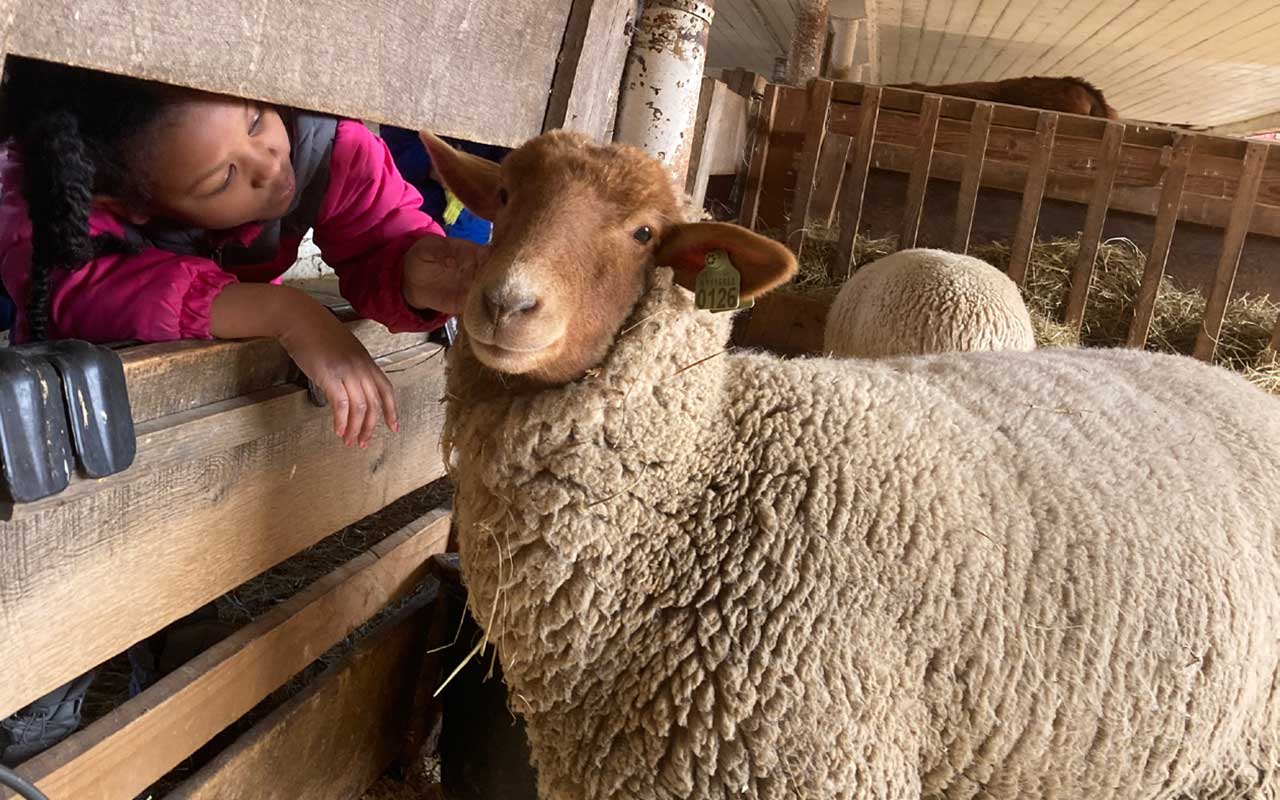Main Street News

ANIMAL KINGDOM
Many people are drawn to the Hudson Valley for its booming food culture and variety of farm-to-table restaurants. The region is also home to The Culinary Institute of America, which honed the talents of David Burke, Todd English, Michael Mina, and the late Anthony Bourdain, among other luminaries.
Agriculture has a long history in the region and remains vital to the Empire State’s economy. Every year, it ushers in more than $5 billion in sales. To maintain a viable future, it’s imperative that younger generations continue to become educated about agriculture and farming as well as learn how to be stewards of the land.
Historic farm
The Stony Kill Farm Environmental Education Center, a 754-acre farm in Wappingers Falls, NY, helps sustain the future of agriculture in the region. The farm is located on the ancestral land of the Wappinger – an Eastern Algonquian Munsee-speaking Native American people. The land was also once home to the Verplanck Family.
On July 23, 1942, James DeLancey Verplanck and his half-brother John Bayard Verplanck graciously granted 754 acres of land to the NYS Department of Education to be used as a teaching farm by SUNY Farmingdale in Long Island. In 1973, the farm and land were transferred to the NYS Department of Environmental Conservation (DEC).
In 1977, Stony Kill Foundation was formed as a nonprofit organization to support the DEC’s work, and the farm and education center thrived for three decades. In 2010, amid the Great Recession, the DEC ceased environmental education activities at Stony Kill and proposed closing the farm.
The Foundation responded with a campaign to save Stony Kill, and the nonprofit was eventually able to negotiate that Stony Kill would remain open. In January 2011, Stony Kill Foundation became responsible for operating the farm and running its education programs, and the DEC began maintaining the grounds and supporting Stony Kill in other ways. In 1980, the farm was added to the National Register of Historic places.
Explore and educate
The historic farmstead sits on 754 acres of land, which include thick forests and sprawling meadows. There are lots of enticing things to do and learn for people of all ages. The site boasts a 19th century barn with livestock, several ponds and hiking trails (one is wheelchair accessible), a greenhouse and blooming gardens, a historical 18th century tenant farmhouse and manor house, and classroom facilities.
Calling all fitness buffs and nature enthusiasts. The property is open to the public daily year-round, and its grounds continue to operate as a working farm. From February through November during Open Barn weekends, the public is welcome to visit the cows, sheep, and other livestock. Visiting the farm is free and doesn’t require a reservation.
Those interested in witnessing the animals outside of the regularly scheduled Open Barn times, can often spot the cows and sheep grazing in the pasture. They can also catch a glimpse by peeping through barn windows.
Welcoming the public, organizing activities and programs, and hosting volunteers enable Stony Kill Foundation to achieve its mission to educate the public and cultivate environmental stewardship through interpretation of the rich historical, environmental, and agricultural heritage of the farm.
The Foundation strives to connect people of all ages and backgrounds with rich, hands-on experiences in the outdoors. In addition to offering small-scale agriculture, it fosters community through farming, volunteerism, and celebration. It also spearheads efforts to preserve and restore historic structures and equipment on the property.
Every year, more than 30,000 people visit Stony Kill. Beyond being used by the local community, Stony Kill Farm’s programs are tapped by visitors from New York City and beyond.
“Stony Kill Farm is a place to slow down, explore, and connect with hands-on experiences in nature and small-scale agriculture,” said Erik Fyfe, executive director of the Stony Kill Foundation.
Heritage breeds
“At Stony Kill Farm, we raise heritage breed animals, which are the kinds of animals you would have found on small farms historically. They are vigorous, forage well, and would have provided farmers with multiple products concurrently. The breeds we raise are particularly well-suited to our climate and to being raised on pasture,” said Kim Pennock, a volunteer and outreach manager at the Stony Kill Foundation.
Stony Kill Foundation recently implemented a new system of rotational grazing to promote livestock health and sustainable agricultural practices. This novel system reduces exposure to harmful microorganisms and other pathogens and disrupts parasite life cycles, resultng in better animal health and well-being.
Supported by the Dutchess County Soil and Water Conservation District, the Foundation used portable fencing to partition its 12-acre pasture into smaller grazing paddocks. Rather than grazing the entire pasture at once, the animals are guided through the paddocks to heavily graze each section before being rotated to the next. This system prompts the animals to eat more evenly over the pasture. It also spreads manure more evenly and improves forage quality and soil health.
Let’s count sheep!
In 2019, Stony Kill Foundation purchased its first two breeding stock of registered Tunis sheep. The breed was selected due to its historical relevance to American agriculture and for aligning with Stony Kill’s goal to provide education about the plight of heritage breed animals that are vanishing from America’s farms.
The sheep have a long history in the region. In 1799, George Washington was gifted two sheep by Hammuda Ibn Ali, Bey of Tunis. Thomas Jefferson also kept a flock of Tunis sheep. This “dual-purpose” breed is traditionally raised for both wool and meat.
In 1896, the American Tunis Breeders Association was established. In 2006, the Tunis Registry recorded 1,475 sheep (up from 605 in 1990). This moved the breed from the Livestock Conservancy’s “threatened” list to the “watch” list. In 2011, Tunis flocks were recorded in 32 states.
While visiting Stony Kill, you’ll recognize the Tunis by observing their tan and red faces and wool-free cheeks. They also have white on the crowns of their heads and the tips of their tails.
Community effort
There are so many ways that the community can become a part of America’s history and help sustain its future. Every year, Stony Kill Foundation engages more than 100 active volunteers who promote sustainability by educating visitors.
The farm operates environmental and agricultural education programs for people of all ages. In addition to Homeschool on the Farm, it hosts field trips, a summer and winter camp, educational birthday parties, workshops, and nature walks.
Every year, its team hosts events and festivals; coordinates community science projects related to bird and pollinator conservation and water quality; and maintains perennial, pollinator, and demonstration vegetable gardens.
Programs
Stony Kill Foundation Summer Explorers Camp empowers kids (ages four to twelve) to explore the outdoors and experience a sense of curiosity and appreciation for nature. The camp offers a balance of structured and free play with environmental exploration, arts and crafts, and age-appropriate learning activities.
Homeschool on the Farm is designed to be fully outdoors except in times of inclement weather. Mornings kick off with a hike followed by homesteading lessons, which include caring for livestock, learning to sew and mend clothes, tracking wildlife, and recording weather patterns.
School field trips also enable students to participate in programs that will foster a better understanding of the farm’s agricultural history and environmental ecology. Stony Kill Foundation also hosts other youth programs throughout the year.
Hosting a birthday? The farm is an ideal site for fetes for ages two and up. Have the wee ones explore the barnyard and meet some furry friends. They’ll also learn about the roles of animals at the farm and enjoy a hands-on experience with the sheep.
Get the buzz on bees. They play a key role in balancing the ecosystem. In fact, one of every three bites of food comes from the pollination of honeybees. That’s why the Foundation has an active bee apiary and observation hive. Through its Stony Kill Beekeeping Program, adults and children can learn about honeybees. Hurry! The season kicks off in April.
On site
The farm is also home to Stony Kill Foundation’s Organic Community Garden, which was established in 1977 and is one of the longest-running gardens of its kind in the Hudson Valley, according to Fyfe.
It invites community members to cultivate the soil while connecting with others. The garden’s 130 plots are utilized by more than 70 families. For a minimal fee of $50 for the season (March 1 through February 28 of the following year), growers can put food on their own tables. No trip to the supermarket is necessary.
The Verplanck Memorial Perennial Garden traces its history back to 1997 when the relatives of sisters Elizabeth, Suzanne, and Wilhelmina Andrews donated funds to establish this blooming garden. In the early 1900s, the Andrews sisters lived in the Manor House under the care of their uncle John Bayard Rodgers Verplanck and aunt Susan VanWyck Andrews Verplanck.
The garden features plantings that were specifically selected to lure butterflies and birds. Bees and other insects also flutter about. Every spring, bluebirds and wrens descend upon the garden.
The Greenhouse is a destination for educating people about all things agriculture. Every year, students from as far away as the New York City school system make the trip up to the farm to learn about where their water and food come from.
The Foundation’s field trip programs empower kids to learn about the life cycle of plants. Kids also have an opportunity to touch and, in some cases, taste the bounty in season.
The Greenhouse is periodically opened on weekends (check Stony Kill Foundation’s social media for announcements). Stop in and browse its range of succulents, hanging plants, and flowering plants.
Each spring, Stony Kill Foundation also runs a spring Plant sale. Through March 15, the Foundation is collecting orders for the a variety of vegetables and herbs grown organically in the greenhouse. Pick-up for the plants will be held in May.Trail time
Year-round, Stony Kill Farm’s trails are open daily from sunrise to sunset. Every season offers an abundance of reasons to meander the farm’s nearly nine miles of trails.
Wander the Woodland Trail – a wheelchair accessible path located near the Visitors Center. Guests will see lots of furry friends, from woodpeckers to squirrels, chipmunks, and more. For more adventurous folks, there’s Verplanck Ridge – a moderate climb through mixed hardwood forest and open meadow. Wildlife includes Eastern bluebirds, furry rabbits, red-tailed hawks, and other winged- and cuddly creatures.
The Sierra Trail passes through hardwood forest, evergreens, wetland, and open meadows, which are home to ducks, geese, herons, frogs, turtles, and beyond. Those who yearn to escape and find some serenity, will enjoy the Muller Pond Trail. While there, they’ll likely spot a variety of critters from salamanders to waddling ducks and hopping frogs.
Finally, explore the Freedom Trail for diverse terrain that engages visitors with its rock walls, hills, wetland, field, and forest. Keep your eyes open for great horned owls, spring peepers, red-backed salamanders, and wood frogs. The Farm Trail offers a loop between a cornfield and woodland area. There are a host of animals and birds from red-tailed hawks to kestrels, north harriers, woodchucks, coyotes, and tree swallows.
Be sure to check Stony Kill Foundation’s website and social media for hikes, events, and other programs on the farm. •
To learn more about the Stony Kill Environmental Center, visit stonykill.org or call (845) 831-3800. Visit in person at 79 Farmstead Lane, Wappingers Falls, NY.


